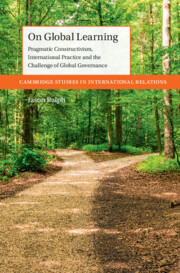 On Global Learning
On Global Learning Book contents
- On Global Learning
- Cambridge Studies in International Relations: 165
- On Global Learning
- Copyright page
- Dedication
- Epigraph
- Contents
- Acknowledgements
- 1 Introduction
- 2 Norms and Practice
- 3 Habit, Habitus and Conscientious Reflection
- 4 Learning, Democracy and the Realist Critique
- 5 Pragmatic Constructivism and the Challenge of Global Governance
- References
- Index
- Cambridge Studies in International Relations: 165
4 - Learning, Democracy and the Realist Critique
from Part I
Published online by Cambridge University Press: 07 September 2023
- On Global Learning
- Cambridge Studies in International Relations: 165
- On Global Learning
- Copyright page
- Dedication
- Epigraph
- Contents
- Acknowledgements
- 1 Introduction
- 2 Norms and Practice
- 3 Habit, Habitus and Conscientious Reflection
- 4 Learning, Democracy and the Realist Critique
- 5 Pragmatic Constructivism and the Challenge of Global Governance
- References
- Index
- Cambridge Studies in International Relations: 165
Summary
This chapter addresses the book’s first question by focusing on the Realist critique of classical Pragmatism. This insists that political interests corrupt processes of social learning and argues that power determines how best practice (and the public good) is defined. This criticism was levelled directly at Dewey by his contemporaries, especially Morgenthau and Niebuhr, and it continues to inform neorealism. Inspired by Dewey’s response, the chapter argues Pragmatism is not blind to power or self-interest, it simply emphasizes, like contemporary IR constructivists, that understandings of the self (its identity and its interests) are not fixed; they are instead contingent on the self’s experience of interacting with its material and social environment. The normative implication for Pragmatists is that theorists should render that process intelligent by subjecting it to ‘conscientious reflection’. That process is a political one to the extent access to a community of inquiry is contingent on power. Part of the Pragmatist ‘vocation’ is a commitment to balancing political power by supporting Deweyan ‘publics’: those who are indirectly affected by practice but excluded from the relevant communities of practice. The chapter concludes by reflecting on the implication for key concepts in Realist and Pragmatist thought, including tragedy, prudence and learning.
- Type
- Chapter
- Information
- On Global LearningPragmatic Constructivism, International Practice and the Challenge of Global Governance, pp. 103 - 127Publisher: Cambridge University PressPrint publication year: 2023


